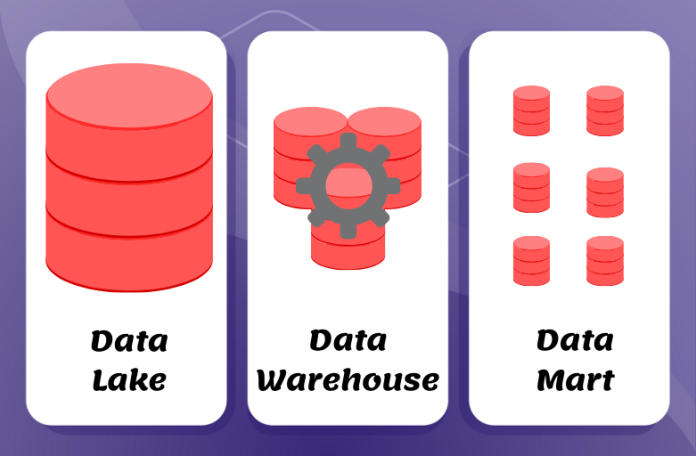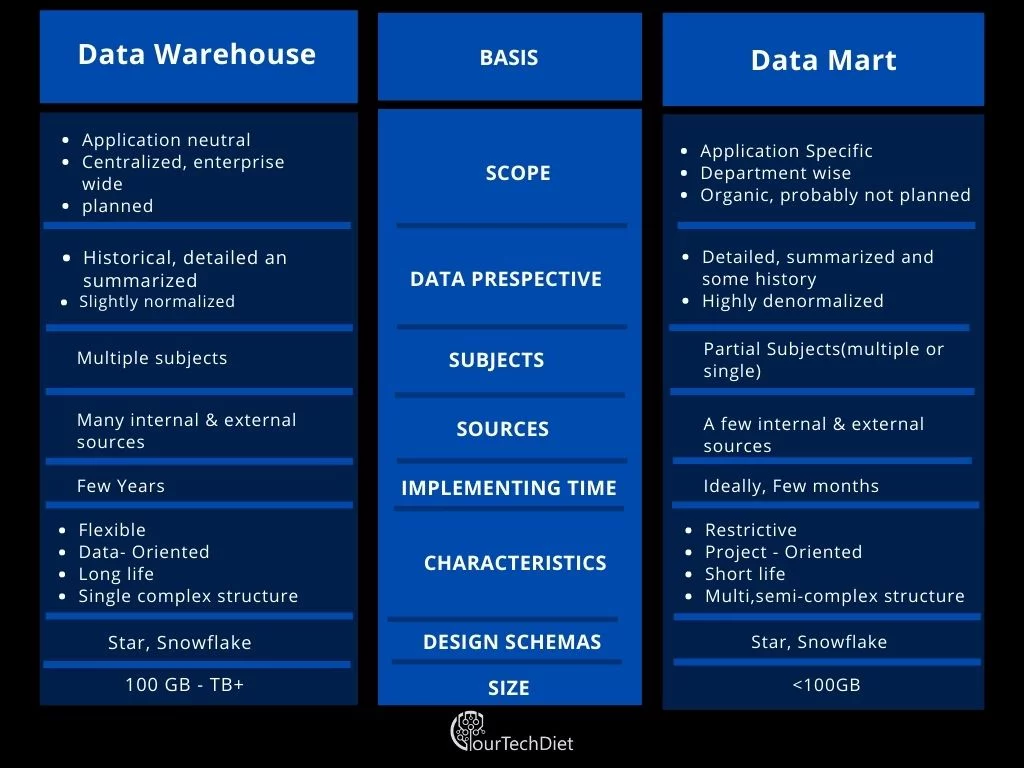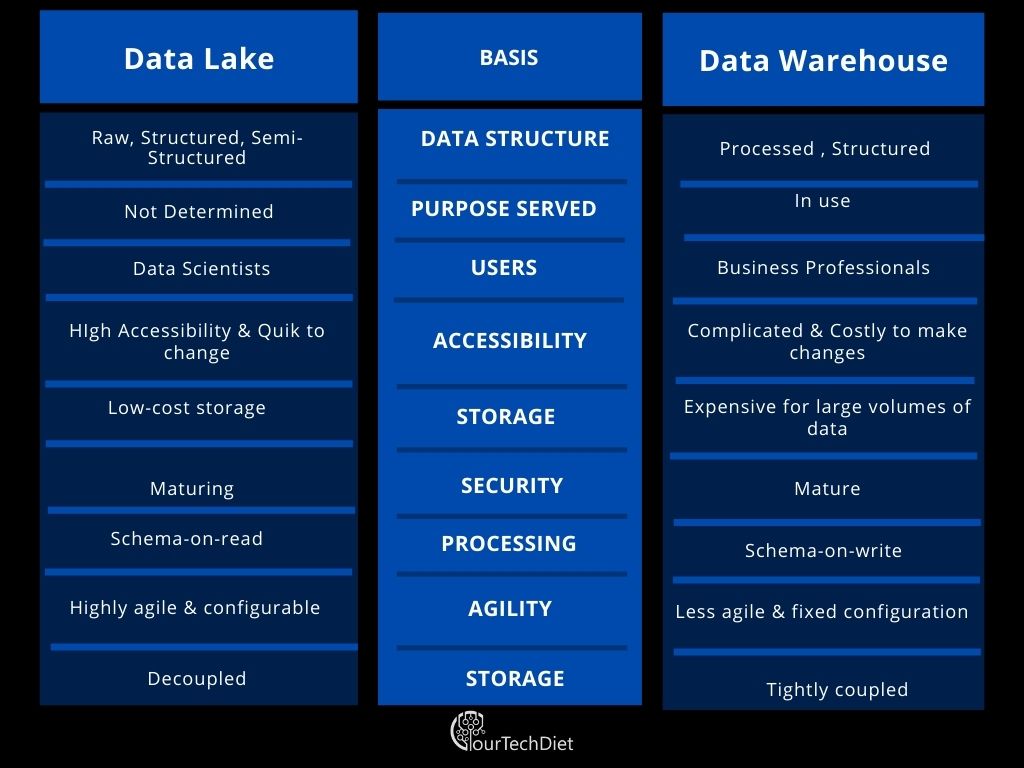As the trends show, interest in data analysis has been increasing over recent years and really gained pace in the last couple of years.
In present times, having data is actually a competitive edge. Companies with more and more accurate data are most likely to succeed.
This is the reason data trends have been on the rise in recent years, especially in the US.
trends.embed.renderExploreWidget(“TIMESERIES”, {“comparisonItem”:[{“keyword”:”Data Analytics”,”geo”:”US”,”time”:”today 5-y”}],”category”:0,”property”:””}, {“exploreQuery”:”date=today%205-y&geo=US&q=Data%20Analytics”,”guestPath”:”https://trends.google.com:443/trends/embed/”});
See below the trends for a data warehouse, data lake, and data mart over the years.
trends.embed.renderExploreWidget(“TIMESERIES”, {“comparisonItem”:[{“keyword”:”data warehouse”,”geo”:”US”,”time”:”today 5-y”},{“keyword”:”DATA LAKE”,”geo”:”US”,”time”:”today 5-y”},{“keyword”:”DATA MART”,”geo”:”US”,”time”:”today 5-y”}],”category”:0,”property”:””}, {“exploreQuery”:”date=today%205-y&geo=US&q=data%20warehouse,DATA%20LAKE,DATA%20MART”,”guestPath”:”https://trends.google.com:443/trends/embed/”});
Before we cascade further into the blog, let me tell you why organizations need to have data repositories in the first place.
-
Reporting
Having clear, error-free, and accurate data helps in easier reporting and analysis of data at the time of emergencies or even in normal situations.
Organizations having their repositories full of isolated data helps them in quick and hassle-free reporting as clustered data takes time to untangle it into something useful.
-
Problem tracking
It’s easier for data administrators to track problems and spot any problems if the data is sorted.
-
Preservation
Having a data repository helps in the preservation of data and hurried access to it when needed suddenly.
Today’s blog is mainly about highlighting the differences between data lakes, data warehouses, and data marts, i.e. data lake vs. data warehouse vs. data mart.
While many people are using data for researches and analytics, I often face instances where there isn’t a clear understanding or still a confusion between relating these three terms. Not to worry, grab your cup of coffee and cruise through this blog and you’ll end up with a clearer picture. So let’s get started.
The data lake is a repository of data where the information is stored in raw/natural form. A data lake usually consists of all kinds of data whether unstructured or structured.
The only source of data present in data lakes is source system and all the data is retained in the data lakes unlike in the data warehouse. Few examples of data lakes are Azure Data Lake and Amazon S3.
Data warehouse, on the other hand, consists of data that can be used for functions like reporting and analysis.
A data warehouse is one of the core components of business intelligence as it contains all the refined data that is needed by the BI solutions.
Few of the top data warehouses in the present market are Teradata, Oracle, Amazon Web Series, Cloudera, and MarkLogic.
After knowing these two you might be wondering what a data mart would be all about. Well, no waiting here.
Datamart is actually a constituent of the data warehouse. To be precise, a data mart is a subset of data warehouse.
Let me explain it this way, if data warehouse consists of all the data of the organization then data mart is the place where you can find data about a single department.
In the architecture, 10 data marts mean data of 10 different departments. Easy isn’t it?
Let’s try to understand with the below-mentioned table highlighting a few key differences between data lake and data warehouse.
Also Read: 4 Best Use Cases of Data Lake
So we can understand from the above table that data warehouses contain the processed data which can be included to make guided business decisions through reporting, analysis, and data mining.
Also, the data in data warehouses come from multiple sources.
Whereas data lakes contain the amalgam of structured, unstructured, and raw data.
Let me put it this way, if data lake is a natural body of water containing both impure and pure water then the data warehouse is a packaged and processed bottle of mineral water which is easy and ready for consumption.
Now, you must be wondering why there isn’t any mention of data mart in the table above. That’s because data mart being the subset of a data warehouse, the parameters that differentiate data lake and data warehouse would not apply to data mart.
So here’s another table showcasing the differences between Data Warehouse and Data Mart.
So the above picture shows the key indicators which differentiate the data warehouse from the data mart.
As simple as it may seem now, knowing the differences between these terms is crucial in order to deduce any value from the data.
Recommended For You:



